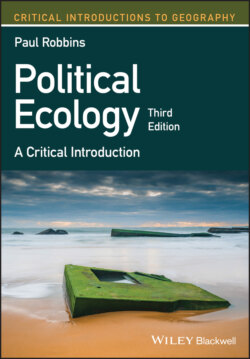Читать книгу Political Ecology - Paul Robbins - Страница 36
From sewer socialism to mitigating floods: hazards research
ОглавлениеThe politics and economics of environmental issues, though briefly eclipsed by environmental determinism in the early twentieth century, never fully left the scientific agenda. With increasing recognition of the vulnerability of modern society to environmental perturbations like floods, earthquakes, droughts, and fires, as well as to the toxins of its own invention, a policy‐oriented avenue of research began to open in the early twentieth century. Focusing both on “natural” and “technological” problems faced by human communities, hazards research took as its goal the rational management and amelioration of risk – defined as the calculable likelihood of problematic outcomes of human actions and decisions.
This approach emerged in the wake of increasing political urban activism around issues of environmental health and welfare, as settlement house workers and other activists, mostly women, rose to take stock of environmental conditions and the planning regimes that surrounded waste, water, and air (Box 2.1). The Women's National Rivers and Harbors Congress, Women's Forestry Commissions, and Federation of Women's Clubs throughout America joined with socialist/progressive mayors, unions, and municipal leagues during this period to champion food safety and urban infrastructure reform. The research component of this “sewer socialism” (named for the socialist party activists of Milwaukee who championed infrastructure and worker health; see Beck 1982) was informal but thorough, and activist researchers like Alice Hamilton and Florence Kelly performed path‐breaking street‐level analyses of environmental hazards, revealing relationships between typhoid and plumbing, and between toxins or machinery and workplace injury and death (Bailes 1985; Darnovsky 1992). More formally, Jane Addams, along with her cadre of public‐university‐trained social workers, conducted the first‐ever systematic assessment of the relationship between municipal garbage collection in Chicago's wards and local death rates (Addams 1910).
